|
|
|
Sort Order |
|
|
|
Items / Page
|
|
|
|
|
|
|
| Srl | Item |
| 1 |
ID:
113730
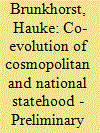

|
|
|
|
|
| Publication |
2012.
|
| Summary/Abstract |
The article claims that we should not just look towards a utopian future in fulfilling a claim about realization of a cosmopolitan, non-national world order. Already during antiquity the idea of a transcendent universal order took on a differentiated form at the same time as there happened to be institutionalization. Since the legal revolution of the long 12th century, this duality has been constitutional and has had a hierarchical structure. However, not only was the invention legal, it was also organizational; hence, the modern political, legal and organizational powers emerged long before the more celebrated state-building processes of the 16th and 17th centuries. The point is that the order was both political and cosmopolitan, institutional and universal. The nation-state was an exception compared with this long and widespread legacy of cosmopolitan power. But the universality of subjective rights was re-institutionalized according to principles that excluded inequalities. This was set in motion even before the UN Charter, not just with the ideas of 1789 but also institutionalized in Roosevelt's New Deal together with the social and political rights that were institutionalized specifically as a consequence of the World Wars and the political claims that followed.
|
|
|
|
|
|
|
|
|
|
|
|
|
|
|
|
| 2 |
ID:
113732
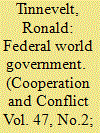

|
|
|
|
|
| Publication |
2012.
|
| Summary/Abstract |
Within contemporary legal and political philosophy there is nothing more unpopular than defending a world state. It seems food for thought for writers like Huxley or Wells, but not a topic that deserves serious philosophical reflection. Fortunately, there are exceptions to this general rule. Theorists such as Höffe, Cabrera, Deudney and Yunker defend a version of a multilayered minimal world state - a model based on the dual principles of federalism and subsidiarity. The focus of this article is on the very fragile balance that proponents of this model have to keep between a simultaneous need for centralization and decentralization. On the basis of a critical analysis of the work of these theorists, it is argued in this article that the safeguards these authors defend to prevent a bloating of government themselves contain a tendency to hierarchical centralization. While some form of world state might be necessary to cope with the challenges posed by globalization, it is essential to discuss the shape and competences of the world state much more critically and in more detail than has been the case in the past.
|
|
|
|
|
|
|
|
|
|
|
|
|
|
|
|
| 3 |
ID:
107611
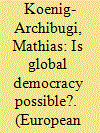

|
|
|
|
|
| Publication |
2011.
|
| Summary/Abstract |
Scepticism about the possibility of a democratically governed global polity is often rooted in beliefs about 'necessary conditions'. Some democracy scholars consider a transition to global democracy to be incompatible with necessary conditions for democratic governance, while some International Relations scholars consider it to be incompatible with necessary conditions for international structural change. This article assesses hypotheses and evidence about democratic transitions within states and transformations in the interaction among states and concludes that arguments based on necessary conditions are not compelling. This suggests that global democracy may be unlikely but it is not impossible.
|
|
|
|
|
|
|
|
|
|
|
|
|
|
|
|
| 4 |
ID:
113731
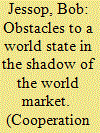

|
|
|
|
|
| Publication |
2012.
|
| Summary/Abstract |
This article explores the obstacles to the development and operation of a world state that are rooted in functional differentiation of modern societies, the ecological dominance of the broadly capitalist world market, and the inherent tendencies of all forms of governance to fail. It also highlights the challenges to the temporal as well as territorial sovereignty of states, whatever their scale of operation, due to the acceleration as well as globalization of social relations. Combining insights from Niklas Luhmann and Karl Marx, the article develops some novel arguments about multi-spatial metagovernance as an alternative approach to the problems posed by a world state as the guarantor of global social order.
|
|
|
|
|
|
|
|
|
|
|
|
|
|
|
|
| 5 |
ID:
119272
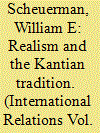

|
|
|
|
|
| Publication |
2012.
|
| Summary/Abstract |
In contemporary international political theory, 'Cosmopolitanism' is typically juxtaposed to 'Realism', with many varieties of the former building on Kantian moral and political ideals, and the latter presumably rejecting Kant and his aspiration for far-reaching global reform. In agreement with a growing body of scholarship that seeks to challenge conventional views of Realism, this essay attends to the surprisingly complex views of the Kantian legacy (including Hans Kelsen, perhaps the most important neo-Kantian international thinker in the last century) within its ranks. Not all Realists have been unambiguously critical of Kant, and when in fact they have criticized him, they have done so for many different reasons. First-generation Realists (e.g. E. H. Carr, John Herz, Hans Morgenthau, Reinhold Niebuhr, Frederick Schuman and Georg Schwarzenberger) offered an ambivalent reading of Kantianism consistent with their endorsement of the ultimate desirability of major alterations to the global status quo, whereas second-generation Realists (i.e. Henry Kissinger and Kenneth Waltz) tended to read Kant so as to transform him into a forerunner of their own anti-reformist and institutionally conservative versions of Realism. An examination of Realism's rendezvous with Kantianism not only helps draw a more differentiated portrayal of Realism than is still found in much scholarship, but it also helps us understand how Realism dramatically changed within a relatively short space of time during the immediate postwar decades. It also points to some important potential starting points for a more fruitful exchange between Cosmopolitans and Realists.
|
|
|
|
|
|
|
|
|
|
|
|
|
|
|
|
| 6 |
ID:
082706
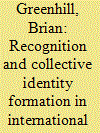

|
|
|
|
|
| Publication |
2008.
|
| Summary/Abstract |
Applying the model of `recognition politics' to international relations can help to explain the identity-based elements of international conflicts that rationalist models leave out. This article uses psychological theories of identity formation to critically assess the recent move by constructivist scholars (most notably Alexander Wendt) to bring the Hegelian idea of the `struggle for recognition' into the study of IR. Examining recognition theory in this way shows that while the insights of `identity theory' developed in the symbolic interactionist tradition lend support to the idea that recognition of the `other' is essential to constituting the identity of the `self', much of the experimental work carried out within Social Identity Theory and its related fields fails to support the claim that recognition leads to the formation of an over-arching collective identity. Without a credible mechanism for collective identity formation, recognition theory fails to predict fundamental change in the international system.
|
|
|
|
|
|
|
|
|
|
|
|
|
|
|
|
| 7 |
ID:
113728


|
|
|
|
|
| Publication |
2012.
|
| Summary/Abstract |
In some contrast to the traditional and ongoing normative discussions about the desirability of a world state, new and more explicitly geo-historical questions about world political integration are being posed, especially (i) whether elements of world statehood are in existence already, (ii) whether a world state is in some sense inevitable, and (iii) whether, and under what conditions, a world state would be sustainable? For instance, the existing and emerging structures of global governance, of a global public sphere and global constitutionalism can be argued to converge to form at least nascent forms of world statehood. Building on and complementing such diagnoses of existing forms of world statehood, the question arises about whether there are possible and likely, or even inevitable, futures in which the emergence of more 'thick' forms of a world state, understood as a more tightly and substantially integrated expression of political community, could evolve. This possibility raises further questions about the legitimacy, viability and sustainability of such a state form. After a brief overview of these issues, the Introduction provides a preview of the following contributions of this special issue as well as the distinction between the 'global' and the 'world' as one possible future research trajectory in the present context.
|
|
|
|
|
|
|
|
|
|
|
|
|
|
|
|
|
|
|
|
|